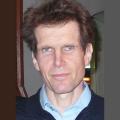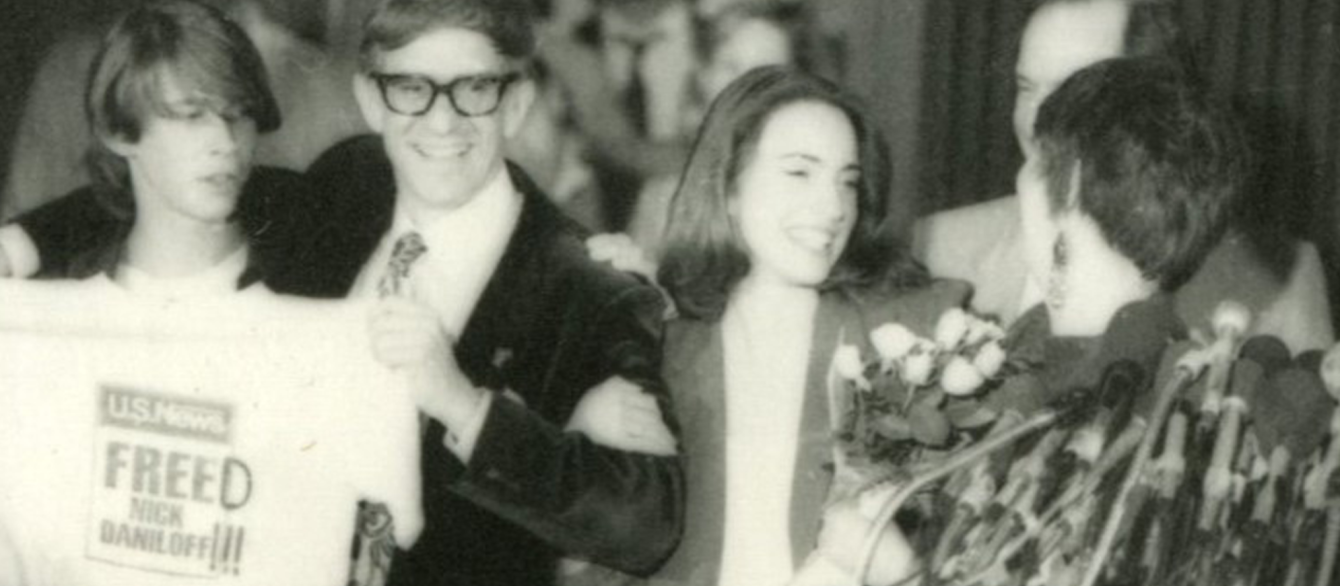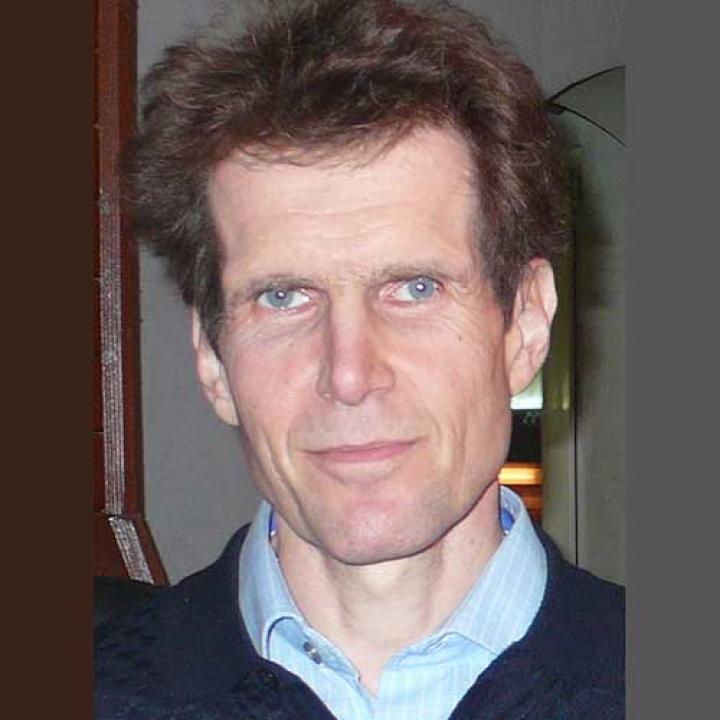Nicholas (Nick) Daniloff, a long-time associate of the Davis Center, died on Oct. 17, 2024, two months shy of his ninetieth birthday. For many years, Nick was a reporter covering the Soviet Union and other countries for prominent Western news organizations, including a six-year stint as the Moscow bureau chief for the weekly news magazine U.S. News & World Report. He came to worldwide attention in late August 1986 when he was arrested by KGB officers on contrived charges and held for two weeks in the notorious Lefortovo Prison in Moscow. His detention sparked an acrimonious diplomatic crisis between the United States and the Soviet Union at the very moment that the new Soviet leader Mikhail Gorbachev had been hoping to improve U.S.-Soviet relations and move away from the dangers of the Cold War. The impasse was eventually resolved through parallel releases of Nick and a detained Soviet diplomat suspected of espionage, but the asperity surrounding the so-called Daniloff affair left a residue of ill will on both sides.
Nick was the grandson of a celebrated general in imperial Russia, Yuri Danilov, who served as quartermaster general (the third highest commander) for the Imperial Russian Army at the start of the First World War. Nick wrote about General Danilov’s exploits in Two Lives, One Russia, a 1988 book that also discussed his own arrest and imprisonment. After the Bolsheviks came to power in late 1917, General Danilov served briefly in the Red Army but eventually left with his family for Constantinople and then Paris, where Nick’s father-to-be, Serge Danilov, married Ellen Burke (and the spelling of the family surname was changed). Serge Daniloff worked as an automobile executive and was assigned to various foreign postings. Nick was born in Paris on Dec. 30, 1934, and learned Russian and French as well as English when he was growing up in the United States, Argentina, and France. Nick went to Harvard for his undergraduate studies, which he completed in 1956. After graduating, he took a low-level job at The Washington Post and Times-Herald for a year and then went to Oxford University for two years of study.
After leaving Oxford, Nick embarked on his journalistic career, including two decades as a foreign and domestic correspondent for United Press International (UPI), one of the main wire services at the time. In the first half of the 1960s, Nick was based in Moscow for UPI, covering such memorable events as the Berlin crises of 1961, the Cuban missile crisis in 1962, Soviet reactions to the assassination of U.S. President John F. Kennedy in 1963, and the abrupt removal of the Soviet leader Nikita Khrushchev in October 1964. It was also during this time, in 1961, that Nick married Ruth Dunn, whom he had originally met during his years at Oxford. After serving in Moscow, he was assigned by UPI to Washington, DC, covering diplomatic affairs and domestic events. After returning to Harvard for a year in 1973-1974 on a Nieman Foundation fellowship, Nick returned to his UPI post in Washington and covered the Watergate scandal and the chaotic end to the U.S. war in Vietnam as well as the gradual waning of U.S.-Soviet détente in the latter half of the 1970s.
In 1980, Nick shifted to U.S. News & World Report, a news weekly akin to TIME and Newsweek. He became Moscow bureau chief the next year and covered the deaths of Leonid Brezhnev, Yuri Andropov, and Konstantin Chernenko and the rise to power of Gorbachev. Because of Nick’s fluency in Russian and the contacts he built up in Moscow, his coverage often served as a guide for other Western journalists.
One of Nick’s contacts in the Soviet Union, Mikhail Luzin, told him in August 1986 that he had some interesting materials he wanted Nick to see. When the two of them met on Aug. 30 in Moscow’s Lenin Hills (now known as Sparrow Hills), Luzin gave Nick a package of what he claimed were news clippings. Luzin hurried off, and within a few minutes two KGB officers came up and arrested Nick, sparking the diplomatic standoff. A week before Nick’s arrest, a Soviet employee at the United Nations headquarters in New York City, Gennadii Zakharov, had been arrested by U.S. counterintelligence personnel on charges of espionage. Nick had heard about Zakharov’s arrest, and he later wrote that as soon as the KGB officers were transporting him to Lefortovo Prison, he surmised that he had become a hostage to be traded for Zakharov.
Once in prison, Nick was accused of being a spy for the CIA but was never put on trial, presumably because of lack of evidence. Ruth Daniloff played a key role in keeping attention focused on the case and in pushing the U.S. government to secure Nick’s release. Two weeks after being detained, Nick was released to the custody of the U.S. Embassy in Moscow but was not given permission to leave the USSR. Zakharov likewise was transferred to the custody of the Soviet Embassy in Washington. On Sept. 29, Nick was finally given permission to leave the Soviet Union — and Zakharov received permission to leave the United States.
The worldwide publicity that surrounded the case had a lasting effect on Nick. Not only did it strengthen his already close bond with Ruth, but it also caused Nick to eschew some of the enthusiasm that many in the West had for Gorbachev, who in the middle of the diplomatic negotiations to resolve the matter had denounced Nick as “a spy caught red-handed.” In May 1992, five months after the USSR had broken apart, Gorbachev spoke at a forum at Harvard’s Kennedy School. Nick went to the forum and, during the question period, asked Gorbachev why he had gone along with such an odious scheme. Caught off-guard, the former Soviet leader expressed remorse.
Nick stopped working as a journalist after the 1986 crisis to focus on writing Two Lives, One Russia and other retrospectives. In 1989, he started teaching journalism at Northeastern University. By then, he and Ruth had settled in Cambridge, living for nearly 25 years on Harvard Street, where they regularly held lively dinners with guests from academia, journalism, and the political world. During his 25 years of teaching at Northeastern, Nick served as dean of the journalism school for eight years and helped elevate it to one of the top positions among such schools. Dozens of journalists who studied under him later recalled his great warmth, his intelligence, and his dedication to teaching.
Besides Two Lives, One Russia, Nick published three other books: The Kremlin and the Cosmos, based on reporting he had done about the Soviet space program (1972); Of Spies and Spokesmen: My Life as a Cold War Correspondent, a memoir of his journalistic career (2008), which drew in part on materials he had examined in Harvard’s Cold War Studies archival collections; and, as co-author, Chechnya's Secret Wartime Diplomacy: Aslan Maskhadov and the Quest for a Peaceful Resolution (2013).
The last of these books (for which I wrote the foreword) stemmed from a deep interest both Nick and Ruth had acquired in Chechnya and the North Caucasus starting in the 1990s. They were angered by the indifference many in the West seemed to have for the people of Chechnya, whose republic was largely destroyed by the Russian government from 1999 through 2009 under Vladimir Putin. Among the Chechens Nick and Ruth sought to assist were orphans who had been born deaf and blind or had been rendered so by the war. The Daniloffs helped establish an organization that would enable such children to receive a full education and a full life outside the dreadful orphanages to which they were usually consigned. Nick and Ruth provided this help outside the limelight, without seeking any publicity for their efforts. I learned about it only because when I was going to Chechnya in 2008, they asked me if I could check about the status of some of the children they had been assisting. When I later told them that the children were coming along well, they were overcome with joy.
The kindness and generosity the Daniloffs displayed when helping Chechen orphans were characteristic of the way the two of them lived their whole lives. Both Nick and Ruth regularly attended the Cold War Studies seminars and Sakharov Human Rights seminars I have long hosted at the Davis Center and gave several presentations of their own. Nick was an avid rower, and he competed in the annual Head of the Charles Regatta for many years. One year when he had to miss the race because of a schedule conflict, he asked if, instead, I would run along the river to race him as he rowed along. It proved to be a lot of fun, and we repeated the mock race numerous times in subsequent years, usually a week or two after Nick competed in the regatta. By the time Nick stopped rowing competitively, he was nearly 80.
After Ruth died in January 2024 at age 88, Nick had a hard time coping. He gave a brief eulogy at Ruth’s memorial service in May 2024, and he was his usual amiable self when I spoke with him afterward, but I could see that he was steadily declining. His death is a sad occasion, but those who knew Nick will remember him for his affability, his kind-heartedness, his vigor in pursuing journalistic leads, and his dedication to his family.






